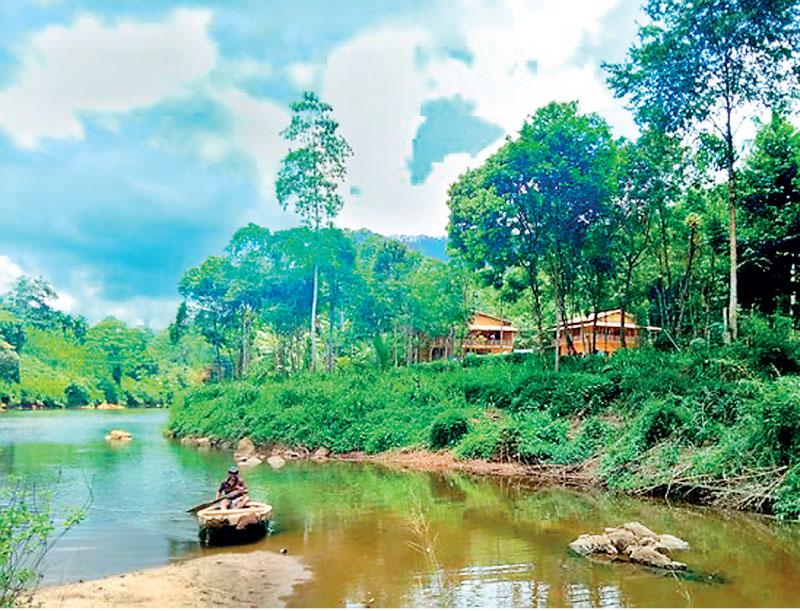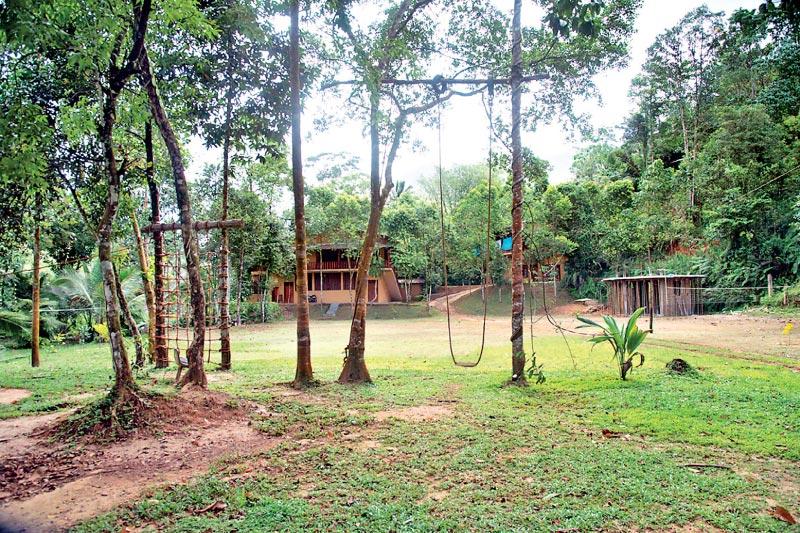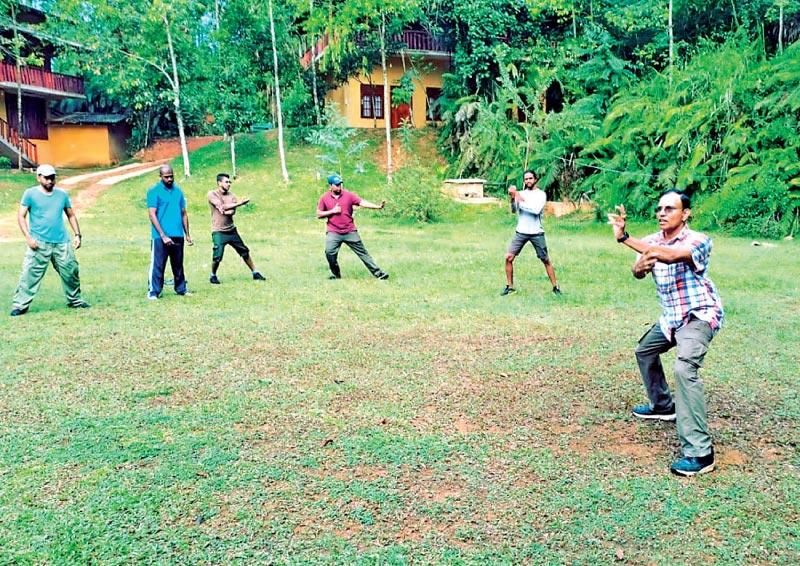05 Aug 2023 - {{hitsCtrl.values.hits}}

While dementia and depression are not the most common causes of death, they are still important public health concerns. There are over 390 million people in the world population who are on antidepressants. This means we lose our minds before we lose our hearts. And the situation in Sri Lanka is not much different to the world scenario. Due to the prevailing economic crisis, political upheaval and distressed youth, Sri Lanka is currently lying at the bottom of the happiness index. Practising meditation to gain Mindfulness is a key solution to overcome this situation. And combining Mindfulness with unique ecotourism opportunities in Sri Lanka will boost an ailing tourism industry too, was the opinion of a Sri Lankan-born academic who is presently based in the UK as the only Buddhist Chaplain to His Majesty’s Armed Forces.
 Prof. Sunil Kariyakarawana, who boasts of an exceptional academic background, has been a university academic on Theoretical Linguistics, Cognitive Science and Philosophy for over 20 years in several leading universities in the world.
Prof. Sunil Kariyakarawana, who boasts of an exceptional academic background, has been a university academic on Theoretical Linguistics, Cognitive Science and Philosophy for over 20 years in several leading universities in the world.
Being a nature lover cum passionate traveller and his numerous years of research on Buddhism, meditation and Mindfulness through ‘Sati’, has prompted him to introduce a novel concept of Mindfulness-based ecotourism in Sri Lanka.
In a candid interview with the Daily Mirror at a picturesque location on the boundary of Sinharaja forest in Lankagama during his recent visit to the homeland, Prof. Kariyakarawana shared what inspired him to come up with this thought.
“I hail from a very remote and deprived part of southern Sri Lanka called Lelwala, where I had my primary education. Then I went to Kelaniya University and obtained a First Class Honours Degree in Linguistics, where I was subsequently appointed as a junior lecturer in 1985.
“Then I proceeded to Canada to obtain my Master’s Degree at the University of Ottawa. Then I moved down to Cornell University where I did my PhD and returned to Sri Lanka where I worked for seven years. After that, I won two post-doctoral fellowships at the University of Rikkyo in Tokyo and University College in London where I studied the area of Learning Disabilities. I guess I’m the only person here who has won six post-doctoral fellowships and scholarships, which I was very fortunate to do.
“In 2001, I returned to Sri Lanka with a lot of hopes to rebuild my department, the Department of Linguistics, especially in the area of Communication Disabilities. About 7% of the world’s population has some kind of communication disability, such as dyslexia and dyspraxia. So, we established a special unit called DSU at the Ragama Medical College with neurologists and neuroscientists in collaboration with the British Council. However, the University System did not allow me to do this because it is always rigid and the new robust and dynamic thinking doesn’t work there. I was disappointed, so I went back to the City University of London.”
“While I was teaching in London an advertisement came up in the Guardian asking for a Buddhist Chaplain. Then I got a phone call from the head of London Buddhist Vihara Ven. Dr Medagama Vajiragnana who said that I was the best person to apply for the post which will help over 6, 000 soldiers, sailors, airmen and women serving in the British armed forces, who were spread all over the world from Canada, Brunei, Germany, Falklands, Gibraltar to the Middle East.
“So I decided to take up the position and ever since I have been working with the royal family, four-star generals and many politicians in the United Kingdom and visiting the British Parliament to present success stories of mental health. They take the mental health and well-being of their forces very seriously. I have been working for the British armed forces for the past 19 years as its only Buddhist Chaplain and it was a great privilege.
“Recently I was appointed an Associate Professor in Buddhism at the Free University of Amsterdam in the Netherlands and I have been teaching Buddhist Spiritual Care. There is an increasing demand for Mindfulness and Buddhism in Europe overall. Since my main area of teaching is theoretical linguistics and clinical linguistics, which specializes in communication disabilities I had the opportunity to involve with the Oxford Mindfulness Centre (OMC). Nowadays, Mindfulness and mental well-being has become a big topic in universities worldwide.
“Sri Lanka also can very easily cash-in in this area as we have not recognized or been sensitive to the outside world about this area of mental well-being and Mindfulness. For over 2, 000 years Mindfulness has been preserved in Sri Lanka due to Buddhism. Out of the 64 years of my life, I have lived 40 years outside my motherland and have seen the great need to observe the world from a different angle.
“Mindfulness has two wings to it. First is sensory connection. You look at people but you don’t see them, you listen to them but you hardly hear them, you walk about but you hardly feel your feet on the ground, you eat your food but when was the last time you tasted it? As William Henry Davies said, “What is this life, if full of care – We have no time to stand and stare”.
“An OMC research before COVID showed that over 390 million people are on anti-depressants at any given time and of course, after COVID it must be much more.
The number of dementia across the globe is now on the rise. Dementia has been an old man’s disease before but now after the forties, one might diagnose with it. All the good doctors in the world are saving our hearts but the mind is neglected. So, before our hearts stop, we will lose our minds. Therefore, the sensory connection is about reconnecting your senses.
“The second wing is once you establish the sensory connection then establishing Mindfulness on an object. In Buddhism, this is clearly explained and called ‘Satipatthana’. Once you place your mind on an object and develop one-pointedness in mind (Citta Ekaggata) this becomes a vibrant force to generate insight. Buddha called this ‘Upattitha Sati’.
“People could ask whether it is ethical to develop the mind for worldly benefits like in the corporate sector for profiteering or in the military the soldiers use Mindfulness for precision in killing using snipers. But Mindfulness starts when you develop insight or wisdom.
“A popular Mindfulness Guru in the world is Jon Kabat-Zinn, an American professor emeritus of medicine at the University of Massachusetts, who founded a programme called Mindfulness-Based Stress Reduction (MBSR) in the 1970s.
|
|
“And then there was a parallel program developed at Oxford University called Mindfulness-Based Cognitive Therapy. Now Mindfulness is influencing many areas and I thought it is very natural for us to develop Mindfulness into Eco-tourism.
My concept is called Mindfulness-Based Ecotourism (MBET). I have spoken to King Charles about this and he was very intrigued and wanted to hear more about it. It is one of the reasons why I wanted to develop this place into a special centre where travelling visitors who love ecotourism can practice Mindfulness.
One of the reasons why I developed this centre is to develop the training element. Something Sri Lanka is lacking is in-service training. Whether it is the state sector or the private sector the in-service training is not much to be seen here. So the employees are stagnating in the same place for forty to fifty years in their careers and get frustrated and tired in life. One of the ways to avoid this scenario is to develop training modules; to train them physically and psychologically. Happiness is a skill, which you get to choose to be happy.
For example, an average person has about 12, 000 to 60, 000 thoughts per day, of which 80% of them were negative and 95% of them were the same repetitive thoughts as the day before. So we have to capitalize on the five percent of only positive thoughts and skillfully turn them into happiness. In Sri Lanka, our skill level is very high compared to world statistics but the happiness level is very low.
“About two years ago when I first travelled to this area in Lankagama, I found this partly developed tourist hotel by a local entrepreneur. Situated in a picturesque environment of mountains and dense foliage of Sinharaja and on the banks of Gin Ganga from one side and the Brahmana Ella waterfall from the other side, I immediately felt that this was the ideal location to initiate my concept of merging Mindfulness with ecotourism.
So, I bought this property not intending to develop it into another income generating star class hotel, which will harm the sensitive environment around it but to convert this area into a place where eager visitors could indulge in nature and experience ecotourism as well as train their minds to achieve and practice Mindfulness.
I am planning to develop this concept further in the future and we are ready to receive our first batch of European visitors by early August, who are extremely interested in Mindfulness and Sri Lankan-based Eco-tourism.
Therefore, my main message to our country is ‘wake up Sri Lanka’, as this is the ‘millennium of the mind’ and let us all work hand in hand to develop it, the professor said.


By Pix by Samantha Perera
10 Jan 2025 1 hours ago
10 Jan 2025 1 hours ago
10 Jan 2025 2 hours ago
10 Jan 2025 2 hours ago
10 Jan 2025 2 hours ago